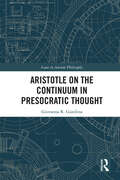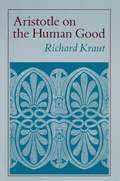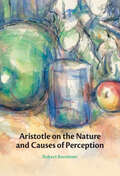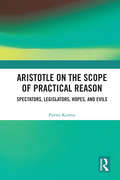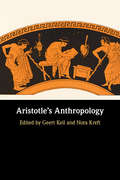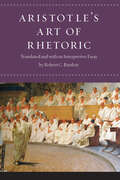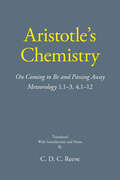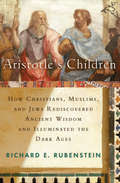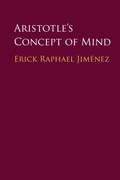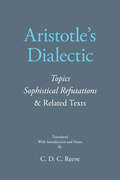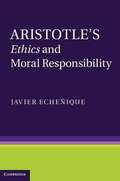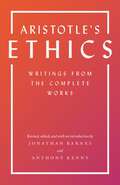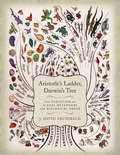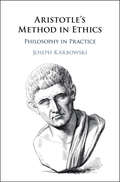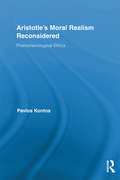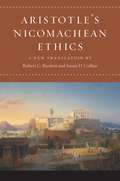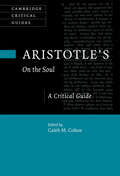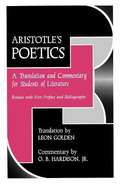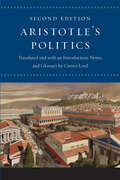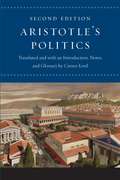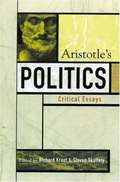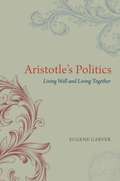- Table View
- List View
Aristotle on the Continuum in Presocratic Thought (Issues in Ancient Philosophy)
by Giovanna R. GiardinaThis book offers the first comprehensive analysis of the origin and development of the concept of physical continuity in ancient thought before Aristotle, combining a thorough study of Presocratic philosophy with Aristotle’s perspective.The concept of continuity plays a fundamental role in Aristotle's philosophy, particularly in his physics; however, nowhere in his corpus does he present his theory of continuity. In this book, readers gain a solid foundation for understanding Aristotle’s theory of the continuum through an in-depth exploration of Presocratic views on being and continuity. The book’s innovative approach critically analyzes Aristotle’s engagement with his predecessors, including the work of Anaximander, the Pythagoreans, Eleatic philosophy, and the Atomists. By addressing this gap in existing literature, this volume not only enriches the discourse on Presocratic thought, but also establishes a clearer understanding of Aristotle’s contributions to the concept of continuity.This book is suitable for students and scholars of ancient philosophy and the philosophy of science, particularly those working on Presocratic philosophy and Aristotle’s thought more broadly.
Aristotle on the Human Good
by Richard KrautAristotle's Nicomachean Ethics, which equates the ultimate end of human life with happiness (eudaimonia), is thought by many readers to argue that this highest goal consists in the largest possible aggregate of intrinsic goods. Richard Kraut proposes instead that Aristotle identifies happiness with only one type of good: excellent activity of the rational soul. In defense of this reading, Kraut discusses Aristotle's attempt to organize all human goods into a single structure, so that each subordinate end is desirable for the sake of some higher goal. This book also emphasizes the philosopher's hierarchy of natural kinds, in which every type of creature achieves its good by imitating divine life. As Kraut argues, Aristotle's belief that thinking is the sole activity of the gods leads him to an intellectualist conception of the ethical virtues. Aristotle values these traits because, by subordinating emotion to reason, they enhance our ability to lead a life devoted to philosophy or politics.
Aristotle on the Nature and Causes of Perception
by Robert RoreitnerIn this book Robert Roreitner offers a fresh interpretation of Aristotle's philosophically intriguing answers to what the nature of perception is, how it can be explained, and how perception is distinguished from mere appearance. He argues that for Aristotle, perception is a complete passive activity, and explains why this notion merely appears self-contradictory to us. He shows how Aristotle succeeds in integrating causal, qualitative, and relational aspects of perception, and explains why he is neither a 'spiritualist' nor a 'materialist'. He presses and resolves an unappreciated dilemma for Aristotle's hylomorphic account of perception and the role of the soul therein. This rich study shows that although Aristotle's understanding of perception may be in many respects outmoded, its core insights remain philosophically engaging. This title is also available as Open Access on Cambridge Core.
Aristotle on the Nature of Community
by Adriel M. TrottThis reading of Aristotle's Politics builds on the insight that the history of political philosophy is a series of configurations of nature and reason. Aristotle's conceptualization of nature is unique because it is not opposed to or subordinated to reason. Adriel M. Trott uses Aristotle's definition of nature as an internal source of movement to argue that he viewed community as something that arises from the activity that forms it rather than being a form imposed on individuals. Using these definitions, Trott develops readings of Aristotle's four arguments for the naturalness of the polis, interprets deliberation and the constitution in Politics as the form and final causes of the polis, and reconsiders Aristotle's treatment of slaves and women. Trott then argues that Aristotle is relevant for contemporary efforts to improve and encourage genuine democratic practices.
Aristotle on the Scope of Practical Reason: Spectators, Legislators, Hopes, and Evils
by Pavlos KontosThis book offers a new account of Aristotle’s practical philosophy. Pavlos Kontos argues that Aristotle does not restrict practical reason to its action-guiding and motivational role; rather, practical reason remains practical in the full sense of the term even when its exercise does not immediately concern the guidance of our present actions. To elucidate why this wider scope of practical reason is important, Kontos brings into the foreground five protagonists that have long been overlooked: (a) spectators or judges who make non-motivational judgments about practical matters that do not interact with their present deliberations and actions; (b) legislators who exercise practical reason to establish constitutions and laws; (c) hopes as an active engagement with moral luck and its impact on our individual lives; (d) prayers as legislators’ way to deal with the moral luck hovering around the birth of constitutions and the prospect of a utopia; and (e) people who are outsiders or marginal cases of the responsibility community because they are totally deprived of practical reason. Building on a wide range of interpretations of Aristotle’s practical philosophy (from the ancient commentators to contemporary analytic and continental philosophers), Kontos offers new insights about Aristotle’s philosophical contribution to the current debates about radical evil, moral luck, hope, utopia, internalism and externalism, and the philosophy of law. Aristotle on the Scope of Practical Reason will appeal to researchers and advanced students interested in Aristotle’s ethics, ancient philosophy, and the history of practical philosophy.
Aristotle's Anthropology
by Geert Keil Nora KreftThis is the first collection of essays devoted specifically to the nature and significance of Aristotle's anthropological philosophy, covering the full range of his ethical, metaphysical and biological works. The book is organised into four parts, two of which deal with the metaphysics and biology of human nature and two of which discuss the anthropological foundations and implications of Aristotle's ethico-political works. The essay topics range from human nature and morality to friendship and politics, including original discussion and fresh perspectives on rationalism, the intellect, perception, virtue, the faculty of speech and the differences and similarities between human and non-human animals. Wide-ranging and innovative, the volume will be highly relevant for readers studying Aristotle as well as for anyone working on either ancient or contemporary philosophical anthropology.
Aristotle's Art of Rhetoric
by AristotleA “singularly accurate, readable, and elegant translation [of] this much-neglected foundational text of political philosophy” (Peter Ahrensdorf, Davidson College).For more than two thousand years, Aristotle’s“Art of Rhetoric” has shaped thought on the theory and practice of persuasive speech. In three sections, Aristotle defines three kinds of rhetoric (deliberative, judicial, and epideictic); discusses three rhetorical modes of persuasion; and describes the diction, style, and necessary parts of a successful speech. Throughout, Aristotle defends rhetoric as an art and a crucial tool for deliberative politics while also recognizing its capacity to be misused by unscrupulous politicians to mislead or illegitimately persuade others.Here Robert C. Bartlett offers an authoritative yet accessible new translation of Aristotle’s “Art of Rhetoric,” one that takes into account important alternatives in the manuscript and is fully annotated to explain historical, literary, and other allusions. Bartlett’s translation is also accompanied by an outline of the argument of each book; copious indexes, including subjects, proper names, and literary citations; a glossary of key terms; and a substantial interpretive essay.
Aristotle's Chemistry: On Coming to Be and Passing Away Meteorology 1.1–3, 4.1–12 (The New Hackett Aristotle)
by Aristotle C. D. ReeveThis new translation of On Coming to Be and Passing Away and Meteorology 1 and 4 fits seamlessly with the other volumes in the New Hackett Aristotle Series, enabling Anglophone readers to study these works in a way previously not possible. The Introduction describes the book that lies ahead, explaining what it is about, what it is trying to do, how it goes about doing it, and what sort of audience it presupposes. Sequentially numbered, cross-referenced endnotes provide the information most needed at each juncture, while a detailed Index indicates the places where focused discussion of key notions occurs.
Aristotle's Children: How Christians, Muslims, and Jews Rediscovered Ancient Wisdom and Illuminated the Middle Ages
by Richard E. RubensteinA true account of a turning point in medieval history that shaped the modern world, from &“a superb storyteller&” and the author of When Jesus Became God (Los Angeles Times). Europe was in the long slumber of the Middle Ages, the Roman Empire was in tatters, and the Greek language was all but forgotten—until a group of twelfth-century scholars rediscovered and translated the works of Aristotle. The philosopher&’s ideas spread like wildfire across Europe, offering the scientific view that the natural world, including the soul of man, was a proper subject of study. The rediscovery of these ancient ideas would spark riots and heresy trials, cause major upheavals in the Catholic Church—and also set the stage for today&’s rift between reason and religion. Aristotle&’s Children transports us back to this pivotal moment in world history, rendering the controversies of the Middle Ages lively and accessible, and allowing us to understand the philosophical ideas that are fundamental to modern thought. &“A superb storyteller who breathes new life into such fascinating figures as Peter Abelard, Albertus Magnus, St. Thomas Aquinas, Roger Bacon, William of Ockham and Aristotle himself.&” —Los Angeles Times &“Rubenstein&’s lively prose, his lucid insights and his crystal-clear historical analyses make this a first-rate study in the history of ideas.&” —Publishers Weekly
Aristotle's Concept of Mind
by Jiménez Erick RaphaelIn this book, Erick Raphael Jimnez examines Aristotle's concept of mind (nous), a key concept in Aristotelian psychology, metaphysics, and epistemology. Drawing on a close analysis of De Anima, Jimnez argues that mind is neither disembodied nor innate, as has commonly been held, but an embodied ability that emerges from learning and discovery. Looking to Aristotle's metaphysics and epistemology, Jimnez argues that just as Aristotelian mind is not innate, intelligibility is not an innate feature of the objects of Aristotelian mind, but an outcome of certain mental constructions that make those objects intelligible. Conversely, it is through these same mental constructions that thinkers become intelligent, or come to possess minds. Connecting this account to Aristotle's metaphysics and epistemology, Jimnez shows how this concept of mind fits within Aristotle's wider philosophy. His bold interpretation will interest a wide range of readers in ancient and later philosophy.
Aristotle's Dialectic: Topics, Sophistical Refutations, and Related Texts (The New Hackett Aristotle)
by AristotleAristotle's Dialectic fits seamlessly with the other volumes in the New Hackett Aristotle Series, enabling Anglophone readers to study these works in a way previously not possible. The Introduction describes the book that lies ahead, explaining what it is about, what it is trying to do, and how it goes about doing it. Sequentially numbered, cross-referenced endnotes provide the information most needed at each juncture, while a detailed Index indicates the places where focused discussion of key notions occurs.
Aristotle's Ethics and Moral Responsibility
by Javier EcheñiqueAristotle's Ethics develops a complex theory of the qualities which make for a good human being and for several decades there has been intense discussion about whether Aristotle's theory of voluntariness, outlined in the Ethics, actually delineates what modern thinkers would recognize as a theory of moral responsibility. Javier Echeñique presents a novel account of Aristotle's discussion of voluntariness in the Ethics, arguing - against the interpretation by Arthur Adkins and that inspired by Peter Strawson - that he developed an original and compelling theory of moral responsibility and that this theory has contributed in important ways to our understanding of coercion, ignorance and violence. His study will be valuable for a wide range of readers interested in Aristotle and in ancient ethics more broadly.
Aristotle's Ethics: Writings from the Complete Works - Revised Edition
by AristotleAristotle's moral philosophy is a pillar of Western ethical thought. It bequeathed to the world an emphasis on virtues and vices, happiness as well-being or a life well lived, and rationally motivated action as a mean between extremes. Its influence was felt well beyond antiquity into the Middle Ages, particularly through the writings of St. Thomas Aquinas. In the past century, with the rise of virtue theory in moral philosophy, Aristotle’s ethics has been revived as a source of insight and interest. While most attention has traditionally focused on Aristotle’s famous Nicomachean Ethics, there are several other works written by or attributed to Aristotle that illuminate his ethics: the Eudemian Ethics, the Magna Moralia, and Virtues and Vices.This book brings together all four of these important texts, in thoroughly revised versions of the translations found in the authoritative complete works universally recognized as the standard English edition. Edited and introduced by two of the world’s leading scholars of ancient philosophy, this is an essential volume for anyone interested in the ethical thought of one of the most important philosophers in the Western tradition.
Aristotle's Ladder, Darwin's Tree: The Evolution of Visual Metaphors for Biological Order
by J. David ArchibaldLeading paleontologist J. David Archibald explores the rich history of visual metaphors for biological order from ancient times to the present and their influence on humans' perception of their place in nature, offering uncommon insight into how we went from standing on the top rung of the biological ladder to embodying just one tiny twig on the tree of life. He begins with the ancient but still misguided use of ladders to show biological order, moving then to the use of trees to represent seasonal life cycles and genealogies by the Romans. The early Christian Church then appropriated trees to represent biblical genealogies. The late eighteenth century saw the tree reclaimed to visualize relationships in the natural world, sometimes with a creationist view, but in other instances suggesting evolution. Charles Darwin's On the Origin of Species (1859) exorcised the exclusively creationist view of the "tree of life," and his ideas sparked an explosion of trees, mostly by younger acolytes in Europe. <P><P> Although Darwin's influence waned in the early twentieth century, by midcentury his ideas held sway once again in time for another and even greater explosion of tree building, generated by the development of new theories on how to assemble trees, the birth of powerful computing, and the emergence of molecular technology. Throughout Archibald's far-reaching study, and with the use of many figures, the evolution of "tree of life" iconography becomes entwined with our changing perception of the world and ourselves.
Aristotle's Method in Ethics: Philosophy in Practice
by Joseph KarbowskiThis book examines Aristotle's method in ethics from the vantage point of his broader conception of philosophy. Joseph Karbowski challenges longstanding dialectical orthodoxy and argues instead that, in his ethical treatises, Aristotle is seeking the first principles of a demonstrative ethical science, a science of human goodness, using an ethically adapted version of the method described in the second book of his Posterior Analytics. Part I of this volume develops a novel interpretation of Aristotle's conception of philosophy, which highlights its ambition to scientific knowledge (epistēmē) and its flexible approach to philosophical inquiry. Part II then demonstrates Aristotle's scientific and flexible approach to philosophy at work in his ethical treatises. The book shows how the aspiration to scientific knowledge is compatible with Aristotle's remarks about ethical precision, the practical aim of ethics, and the particular orientedness of phronēsis (practical wisdom).
Aristotle's Modal Syllogistic
by Marko MalinkAristotle was the founder not only of logic but also of modal logic. In the Prior Analytics he developed a complex system of modal syllogistic which, while influential, has been disputed since antiquity--and is today widely regarded as incoherent. In this meticulously argued new study, Marko Malink presents a major reinterpretation of Aristotle's modal syllogistic. Combining analytic rigor with keen sensitivity to historical context, he makes clear that the modal syllogistic forms a consistent, integrated system of logic, one that is closely related to other areas of Aristotle's philosophy. Aristotle's modal syllogistic differs significantly from modern modal logic. Malink considers the key to understanding the Aristotelian version to be the notion of predication discussed in the Topics--specifically, its theory of predicables (definition, genus, differentia, proprium, and accident) and the ten categories (substance, quantity, quality, and so on). The predicables introduce a distinction between essential and nonessential predication. In contrast, the categories distinguish between substantial and nonsubstantial predication. Malink builds on these insights in developing a semantics for Aristotle's modal propositions, one that verifies the ancient philosopher's claims of the validity and invalidity of modal inferences. Malink recognizes some limitations of this reconstruction, acknowledging that his proof of syllogistic consistency depends on introducing certain complexities that Aristotle could not have predicted. Nonetheless, Aristotle's Modal Syllogistic brims with bold ideas, richly supported by close readings of the Greek texts, and offers a fresh perspective on the origins of modal logic.
Aristotle's Moral Realism Reconsidered: Phenomenological Ethics (Routledge Studies in Ethics and Moral Theory)
by Pavlos KontosThis book elaborates a moral realism of phenomenological inspiration by introducing the idea that moral experience, primordially, constitutes a perceptual grasp of actions and of their solid traces in the world. The main thesis is that, before any reference to values or to criteria about good and evil—that is, before any reference to specific ethical outlooks—one should explain the very materiality of what necessarily constitutes the ‘moral world’. These claims are substantiated by means of a text- centered interpretation of Aristotle’s Nicomachean Ethics in dialogue with contemporary moral realism. The book concludes with a critique of Heidegger’s, Gadamer’s and Arendt’s approaches to Aristotle’s ethics.
Aristotle's Nicomachean Ethics
by Aristotle Robert C. Bartlett Susan D. CollinsThe Nicomachean Ethics is one of Aristotle’s most widely read and influential works. Ideas central to ethics—that happiness is the end of human endeavor, that moral virtue is formed through action and habituation, and that good action requires prudence—found their most powerful proponent in the person medieval scholars simply called “the Philosopher.” Drawing on their intimate knowledge of Aristotle’s thought, Robert C. Bartlett and Susan D. Collins have produced here an English-language translation of the Ethics that is as remarkably faithful to the original as it is graceful in its rendering. Aristotle is well known for the precision with which he chooses his words, and in this elegant translation his work has found its ideal match. Bartlett and Collins provide copious notes and a glossary providing context and further explanation for students, as well as an introduction and a substantial interpretive essay that sketch central arguments of the work and the seminal place of Aristotle’s Ethics in his political philosophy as a whole. The Nicomachean Ethics has engaged the serious interest of readers across centuries and civilizations—of peoples ancient, medieval, and modern; pagan, Christian, Muslim, and Jewish—and this new edition will take its place as the standard English-language translation.
Aristotle's Nicomachean Ethics
by Robert C. Bartlett Susan D. CollinsThe Nicomachean Ethics is one of Aristotle’s most widely read and influential works. Ideas central to ethics—that happiness is the end of human endeavor, that moral virtue is formed through action and habituation, and that good action requires prudence—found their most powerful proponent in the person medieval scholars simply called “the Philosopher. ” Drawing on their intimate knowledge of Aristotle’s thought, Robert C. Bartlett and Susan D. Collins have produced here an English-language translation of the Ethics that is as remarkably faithful to the original as it is graceful in its rendering. Aristotle is well known for the precision with which he chooses his words, and in this elegant translation his work has found its ideal match. Bartlett and Collins provide copious notes and a glossary providing context and further explanation for students, as well as an introduction and a substantial interpretive essay that sketch central arguments of the work and the seminal place of Aristotle’s Ethics in his political philosophy as a whole. The Nicomachean Ethics has engaged the serious interest of readers across centuries and civilizations—of peoples ancient, medieval, and modern; pagan, Christian, Muslim, and Jewish—and this new edition will take its place as the standard English-language translation.
Aristotle's On the Soul: A Critical Guide (Cambridge Critical Guides)
by Caleb M. CohoeAristotle's On the Soul aims to uncover the principle of life, what Aristotle calls psuchē (soul). For Aristotle, soul is the form which gives life to a body and causes all its living activities, from breathing to thinking. Aristotle develops a general account of all types of living through examining soul's causal powers. The thirteen new essays in this Critical Guide demonstrate the profound influence of Aristotle's inquiry on biology, psychology and philosophy of mind from antiquity to the present. They deepen our understanding of his key concepts, including form, reason, capacity, and activity. This volume situates Aristotle in his intellectual context and draws judiciously from his other works as well as the history of interpretation to shed light on his intricate views. It also highlights ongoing interpretive debates and Aristotle's continuing relevance. It will prove invaluable for researchers in ancient philosophy and the history of science and ideas.
Aristotle's Poetics: A Translation and Commentary for Students of Literature
by Aristotle Leon Golden O. B. HardisonThis volume combines Leon Golden's highly regarded translation of Aristotle's Poetics and O. B. Hardison's detailed commentary provide a comprehensive account of the principles of the Poetics and of the critical debates they have engendered. Clearly written, highly readable, the volume was designed to meet the needs of students of literature and criticism who are not proficient in Greek, but it has become a standard reference for scholars as well as students.
Aristotle's Politics
by AristotleThe “groundbreaking translation” of the foundational text of Western political thought, now in a revised and expanded edition (History of Political Thought).Aristotle’s masterwork is the first systematic treatise on the science of politics. Carnes Lord’s lucid translation helped raise scholarly interest in the work and has served as the standard English edition for decades. Widely regarded as the most faithful to both the original Greek and Aristotle’s distinctive style, it is also written in clear, contemporary English.This new edition of the Politics retains and adds to Lord’s already extensive notes, clarifying the flow of Aristotle’s argument and identifying literary and historical references. A glossary defines key terms in Aristotle’s philosophical-political vocabulary. Lord has also made revisions to problematic passages throughout the translation in order to enhance both its accuracy and its readability. He has also substantially revised his introduction for the new edition, presenting an account of Aristotle’s life in relation to political events of his time; the character and history of his writings and of the Politics in particular; his overall conception of political science; and his impact on subsequent political thought from antiquity to the present. Further enhancing this new edition is an up-to-date selected bibliography.
Aristotle's Politics
by Carnes LordOne of the fundamental works of Western political thought, Aristotle's masterwork is the first systematic treatise on the science of politics. For almost three decades, Carnes Lord's justly acclaimed translation has served as the standard English edition. Widely regarded as the most faithful to both the original Greek and Aristotle's distinctive style, it is also written in clear, contemporary English. This new edition of the Politics retains and adds to Lord's already extensive notes, clarifying the flow of Aristotle's argument and identifying literary and historical references. A glossary defines key terms in Aristotle's philosophical-political vocabulary. Lord has made revisions to problematic passages throughout the translation in order to enhance both its accuracy and its readability. He has also substantially revised his introduction for the new edition, presenting an account of Aristotle's life in relation to political events of his time; the character and history of his writings and of the Politics in particular; his overall conception of political science; and his impact on subsequent political thought from antiquity to the present. Further enhancing this new edition is an up-to-date selected bibliography.
Aristotle's Politics
by Richard Kraut Steven SkultetyAristotle's Politics is widely recognized as one of the classics of the history of political philosophy, and like every other such masterpiece, it is a work about which there is deep division. Many readers of Aristotle are uncertain whether his Politics has any contribution to make to contemporary debates about political life and political theory. The essays in this volume aim to address, implicitly or explicitly, this very question about the relevance of Arisotle's thinking in contemporary political philosophy. Written by leading scholars in lucid and accessible style, the nine essays in this volume will be a critical resource for newcomers to Aristotle.
Aristotle's Politics: Living Well and Living Together
by Eugene Garver“Man is a political animal,” Aristotle asserts near the beginning of the Politics. In this novel reading of one of the foundational texts of political philosophy, Eugene Garver traces the surprising implications of Aristotle’s claim and explores the treatise’s relevance to ongoing political concerns. Often dismissed as overly grounded in Aristotle’s specific moment in time, in fact the Politics challenges contemporary understandings of human action and allows us to better see ourselves today. Close examination of Aristotle’s treatise, Garver finds, reveals a significant, practical role for philosophy to play in politics. Philosophers present arguments about issues—such as the right and the good, justice and modes of governance, the relation between the good person and the good citizen, and the character of a good life—that politicians must then make appealing to their fellow citizens. Completing Garver’s trilogy on Aristotle’s unique vision, Aristotle’s Politics yields new ways of thinking about ethics and politics, ancient and modern.
